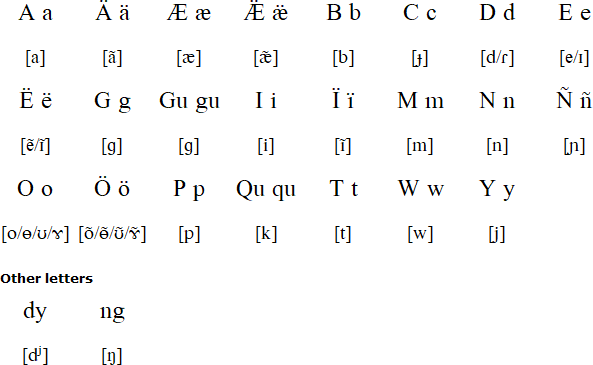Waorani is a languge isolate spoken by about 3,000 people mainly in eastern Ecuador and also in Peru. In Ecuador Waorani speakers are found particularly in the Waorani Ethnic Reserve between the Napo and Curaray rivers, and also in Pastaza and Napo provinces, the Yasuní National Park and the Taromenani Tagaeri Intangible Zone in the Oriente or Ecuadorian Amazon region (Región amazónica). There are small numbers of Waorani speakers in Peru in uncontacted groups.
Waorani is considered endangered as children are taught in Spanish in school and are increasingly shifting to speaking Spanish. There is also increasing contact with speakers of Quichua and other outsiders, particularly oil companies, which is destabalising Waorani communities.
Waorani is also known as Huaorani, Sabela, Wao, Wao tededo, Huao, Auishiri, Aushiri or Ssabela, and Waorani speakers call it Wao Terero. There are three dialects: Tiguacuna, Tuei and Shiripuno.
Linguistic studies of Waorani were first undertaken in the 1970s by Catherine Peeke of SIL (Summer Institute of Linguistics). A way to write Waorani with the Latin alphabet was developed by missionaries, however it is rarely used.

Download an alphabet chart for Waorani (Excel)
Information about the Waorani language
https://en.wikipedia.org/wiki/Waorani_language
https://fr.wikipedia.org/wiki/Huaorani_(langue)
https://es.wikipedia.org/wiki/Idioma_huaorani
http://www.native-languages.org/waorani.htm
https://www.elararchive.org/dk0087/
Adaizan, Ainu, Basque, Burushaski, Candoshi-Shapra, Chitimacha, Eskayan, Hadza, Haida, Karuk, Kawésqar, Keres, Kuot, Kusunda, Kutenai, Natchez, Nihali, Nivkh, Páez, Purepecha, Sandawe, Seri, Sumerian, Tartessian, Ticuna, Tiwi, Tonkawa, Tunica, Urarina, Waorani, Warao, Wardaman, Washo, Yaghan, Yele, Yuchi/Euchee, Zuni
Languages written with the Latin alphabet
Page created: 09.11.23. Last modified: 09.11.23
[top]
You can support this site by Buying Me A Coffee, and if you like what you see on this page, you can use the buttons below to share it with people you know.

If you like this site and find it useful, you can support it by making a donation via PayPal or Patreon, or by contributing in other ways. Omniglot is how I make my living.
Note: all links on this site to Amazon.com, Amazon.co.uk
and Amazon.fr
are affiliate links. This means I earn a commission if you click on any of them and buy something. So by clicking on these links you can help to support this site.
[top]